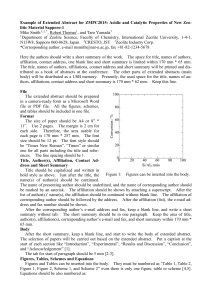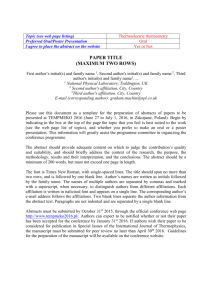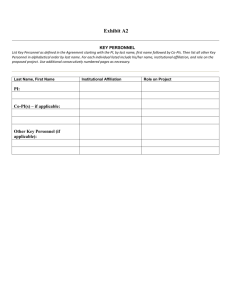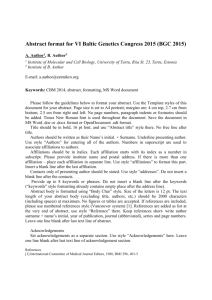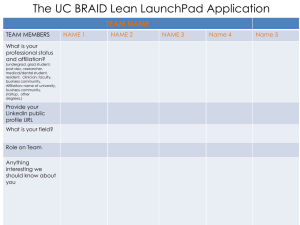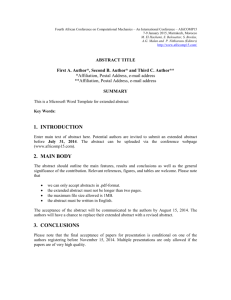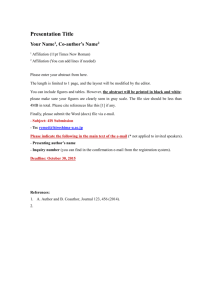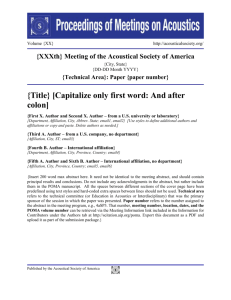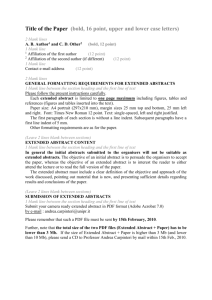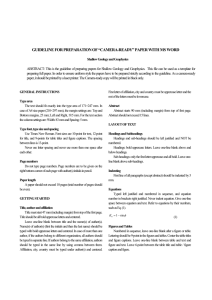Acidic and Catalytic Properties of Zeolites
advertisement
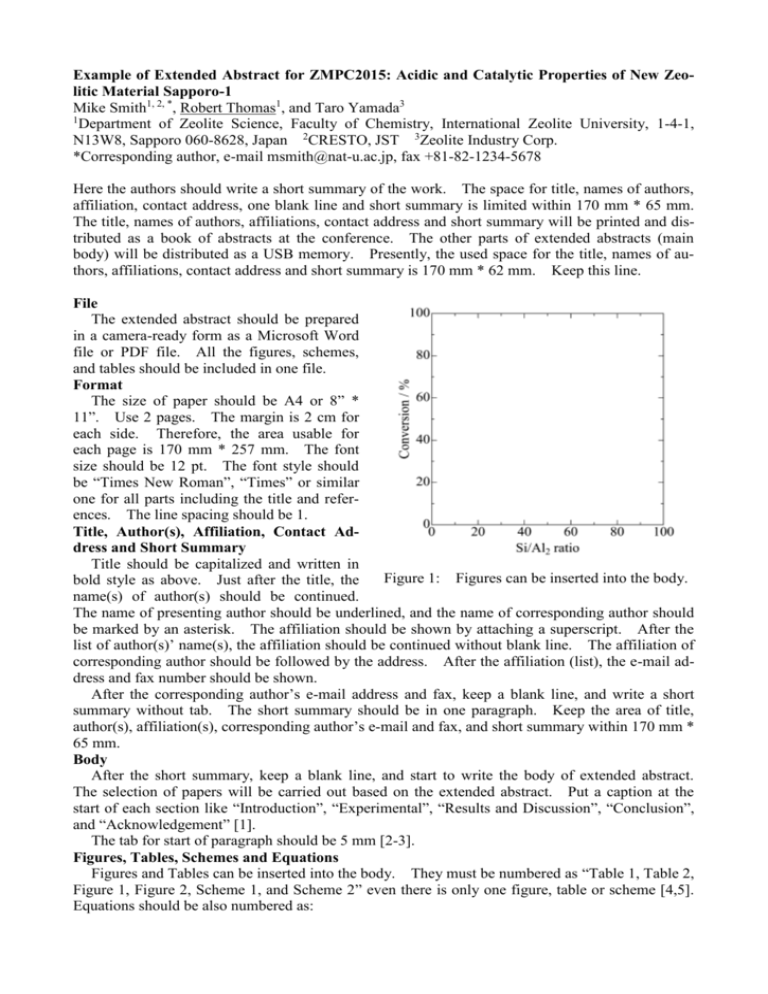
Example of Extended Abstract for ZMPC2015: Acidic and Catalytic Properties of New Zeolitic Material Sapporo-1 Mike Smith1, 2, *, Robert Thomas1, and Taro Yamada3 1 Department of Zeolite Science, Faculty of Chemistry, International Zeolite University, 1-4-1, N13W8, Sapporo 060-8628, Japan 2CRESTO, JST 3Zeolite Industry Corp. *Corresponding author, e-mail msmith@nat-u.ac.jp, fax +81-82-1234-5678 Here the authors should write a short summary of the work. The space for title, names of authors, affiliation, contact address, one blank line and short summary is limited within 170 mm * 65 mm. The title, names of authors, affiliations, contact address and short summary will be printed and distributed as a book of abstracts at the conference. The other parts of extended abstracts (main body) will be distributed as a USB memory. Presently, the used space for the title, names of authors, affiliations, contact address and short summary is 170 mm * 62 mm. Keep this line. File The extended abstract should be prepared in a camera-ready form as a Microsoft Word file or PDF file. All the figures, schemes, and tables should be included in one file. Format The size of paper should be A4 or 8” * 11”. Use 2 pages. The margin is 2 cm for each side. Therefore, the area usable for each page is 170 mm * 257 mm. The font size should be 12 pt. The font style should be “Times New Roman”, “Times” or similar one for all parts including the title and references. The line spacing should be 1. Title, Author(s), Affiliation, Contact Address and Short Summary Title should be capitalized and written in Figure 1: Figures can be inserted into the body. bold style as above. Just after the title, the name(s) of author(s) should be continued. The name of presenting author should be underlined, and the name of corresponding author should be marked by an asterisk. The affiliation should be shown by attaching a superscript. After the list of author(s)’ name(s), the affiliation should be continued without blank line. The affiliation of corresponding author should be followed by the address. After the affiliation (list), the e-mail address and fax number should be shown. After the corresponding author’s e-mail address and fax, keep a blank line, and write a short summary without tab. The short summary should be in one paragraph. Keep the area of title, author(s), affiliation(s), corresponding author’s e-mail and fax, and short summary within 170 mm * 65 mm. Body After the short summary, keep a blank line, and start to write the body of extended abstract. The selection of papers will be carried out based on the extended abstract. Put a caption at the start of each section like “Introduction”, “Experimental”, “Results and Discussion”, “Conclusion”, and “Acknowledgement” [1]. The tab for start of paragraph should be 5 mm [2-3]. Figures, Tables, Schemes and Equations Figures and Tables can be inserted into the body. They must be numbered as “Table 1, Table 2, Figure 1, Figure 2, Scheme 1, and Scheme 2” even there is only one figure, table or scheme [4,5]. Equations should be also numbered as: Si(OCH3)4 + 2H2O → SiO2 + 4CH3OH (1) with blank lines before and after the equation. Table 1: Deadline of Extended Abstract Included in USB memory and Book of Abstracts Year Month Date 2014 Oct. 31 Reference(s) The reference(s) should be at the end of the extended abstract, and numbered in the order of their appearance in the text. Numerals for the references in the text are given in square brackets [ ]. In the reference list, periodicals [1], books [2], multi-author books [3] and proceedings [4] should be cited in accordance with the examples shown at the end. Color Picture(s) Because the extended abstracts will be distributed as a USB memory, we recommend to use colored figures as shown in Fig. 2. Questions If you have any questions, please contact “sec@zmpc.org”. Deadline Please submit via web by 31, Oct., 2014. Figure 2: Hokkaido University References [1] M.S. Jarrell, B.C. Gates and E.D. Nicholson, J. Am. Chem. Soc., 100 (1978) 5727. [2] L.R. Snyder, Principles of Adsorption Chromatography, Marcel Dekker, New York, 1968, p. 201. [3] R.D. Marshall and A. Neuberger, in A. Gottschalk (Editor), Glycoproteins, Vol. 5, Part A, 2nd Ed., Elsevier, Amsterdam, 1972, Chap. 3, p. 215. [4] G.C. Bond and P.B. Wells, Proc. 4th Int. Symp. Scientific Bases for the Preparation of Heterogeneous Catalysts, Louvain-la-Neuve, 1-4 Sept. 1986, paper No. 2.
